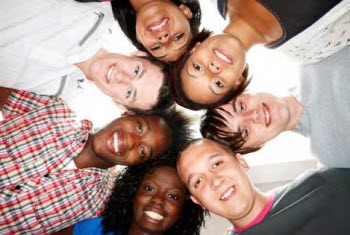Young People and the Law
|
|
This page from JP Boyd on Family Law—and other pages from this Wikibook that discuss BC family law litigation topics—are under editorial review to provide more thorough, current, and practical guidance. Since 2020, procedures, forms, and laws have changed significantly. While gross inaccuracies have been corrected, some details may still be outdated. These pages were not included in the 2024 print edition, and have been highlighted in orange where they appear in the navigation menu on this website. |
This section looks at young people and the law. You will learn about:
- Legal rights and responsibilities of young peple
- Going to school
- Working
- Getting married
- Young people and criminal law
- What happens to youth who commit a crime
- Young people and gangs
- Rules about driving
Help for children
Legal rights and responsibilities of young people[edit]

This chart shows when young people gain legal rights in BC.
Right/Responsibility Age Be responsible for crimes 12 Be sentenced for crimes under adult law 14 Go to work 15 Leave school 16 Get married with permission of parent(s) 16 Get married 19 Get a driver's licence with permission of parent(s) 16 Get a driver's licence 19 Vote in a federal election 18 Vote in a provincial election 18 Drink alcohol 19 Leave home without permission of parent(s) 19 Buy cigarettes 19
Going to school[edit]
All children between the ages of 5 and 16 years must go to public school every day.
This is not true if:
- the child goes to a private school,
- the child is at home studying lessons approved by the government, or
- the child is sick and can’t go to school or there is some other good reason.
Working[edit]
Children under 15 years of age may not work during school hours. They are not usually allowed to work at other times. A child under 15 can’t work without special permission from the government. But children are allowed to do jobs such as babysitting to earn pocket money or to help their families. Children 15 and over can work. They have the same laws to protect them as adult workers.
Getting married[edit]
People 19 years old or older can marry. Young people between 16 and 19 can marry if their parents agree. Young people under 16 usually can’t get married. They have to go to court and ask the judge for permission to marry. The judge will only agree if he or she thinks this is good for them.
Young people and criminal law[edit]
Sometimes children break the law. A child steals something, or damages someone else's property. What will happen?
The law says children under 12 years old can’t be arrested or taken to court. If the police catch children younger than 12 doing something wrong, they take them home and tell their parents. The parents may get help at school or in the community. The Canadian justice system recognizes that youth crime and adult crime need to be dealt with differently. There is a special law for children from 12 to 17 years old. It is called the Youth Criminal Justice Act. This law says:
- People have the right to be protected from young people’s crimes.
- Young people who break the law need to understand that what they did caused harm to the community. They need help to learn how to stay out of trouble and to contribute to the community in a positive way.
- Young people have the same legal rights as adults. The police have to tell young people about their rights and explain what is happening to them.
- Young people don’t go to the same court as adults. There is a special youth court. The judge in youth court will make sure young people get a lawyer.
- People 18 years old or older who break the law are adults and have to go to adult court.
What happens to youth who commit a crime[edit]
The first time a young person aged 12 to 17 years does something wrong, he or she will not usually have to go to court. The young person may get help from a local community group.
Maybe it’s not the first time a young person has been in trouble. Or maybe it is something more serious. Maybe the young person had a weapon such as a knife or gun. Then he or she will have to go to youth court.
If the judge at the court decides the young person is guilty, the youth is called a young offender. The youth will have a youth record.
The judge might:
- make the young person pay a fine,
- make the young person pay for damage with money or with work,
- have the young person do some volunteer work in the community,
- let the young person go home, but someone from the court will check on the young person for up to two years, or
- have the young person go to jail if the crime is serious.
If a young person over 14 years old is accused of doing something very serious they may be sentenced as an adult and receive a tougher sentence than in youth court.
Examples of very serious offences include things such as murder and repeat violent offences.
In most cases the name of the youth who broke the law is not made public. However, in some cases it may be made public, such as when the youth is given an adult sentence for a serious offence.
Young people and gangs[edit]
Some young people join gangs. A gang is a group of people who break the law. Some gangs look for young immigrants who don’t speak English. They look for someone who has few friends and not much money.
At first, the gang members are good to the young people. They introduce them to new friends. Then they ask them to do something for the gang, such as stealing something.
Often, young people are afraid to say no or to leave the gang. They are afraid the gang will hurt them or their family.
Engaging Parents for Safer Youth is a project aimed at providing information to parents about youth and gangs. To download the Steering Kids Away From Gangs booklet, visit www.vsb.bc.ca/steering-kids-away-gangs.
Rules about driving[edit]
Young people over 16 years old can get a driver’s licence if they pass the tests. Parents have to apply for the licence for someone under 19. If young people under 18 years old get a car, they can’t register or get licence plates for it unless their parents sign the papers.
A young person driving a car has the same responsibilities as an adult. For more information about driving in BC see Driving in BC or visit ICBC at www.icbc.com.
Breaking traffic rules[edit]
Sometimes young drivers break the traffic rules. What happens to the youth depends on how serious their actions are.
For example - youth may be speeding, or fail to stop at a stop sign. They will get a ticket and may have to pay money. If youth are caught driving dangerously, it is serious. They will be charged with a criminal offence and have to go to youth court.
Street racing[edit]
Street racing is a very serious offence. People under 18 years old will go to youth court. Drivers 18 years old and older go to adult court.
Help for children[edit]

Many community groups have parenting classes. In these classes, parents learn about taking care of children.
They talk about ways to help their children with problems. They find out how to talk and listen to their children. They also learn about ways to discipline children without harming them.
Some community agencies offer parenting classes in other languages. Parenting classes can help parents to solve the special problems of raising children in a new country.
For example - children usually learn new customs faster than their parents. Children also have a lot of pressure from kids at school to be more “Canadian.” Parents may feel that their children are behaving badly. They may worry that their children don’t respect them anymore.
Many community agencies give information and advice. People can call these agencies when they have a problem and they don’t know where to go for help. Workers at the agencies can help them find the right place to go. There are also parenting programs in English and other languages on TV and radio. For more information about parenting classes contact your nearest community centre or visit www.vancouver.ca/parks-recreation-culture/parenting.aspx.
Helpline for Children[edit]
The Helpline for Children is 310-1234, free from anywhere in BC. A child or youth can call the Helpline for Children if they are being abused or mistreated at home, at school, in the playground, or anywhere else.
If you know a family where a child or youth is being hurt, or if you are afraid you may hurt a child, call the Helpline. Your call is confidential.
- You can call the Helpline, at 310-1234, from anywhere in BC. No area code is required.
- If you are calling from a pay-phone, call the operator “0.” This is a free call. You don’t need to pay. It will not show up on your phone bill.
Youth Against Violence Phone Line[edit]
The Youth Against Violence Line is 1-800-680- 4264, free from anywhere in BC. The Youth Against Violence phone line is a province-wide service that provides confidential help to young people who are affected by youth violence or crime.
Parents and members of the community can also call this line for help and information.
Youth who are worried about their safety, or who want to anonymously report a crime can call the Youth Against Violence phone Line.
Help at school[edit]
Some schools have a police officer who works with the school. The officer comes to the school to teach students about safety and the law. The officer may work with students on school sports teams and in school clubs.
Sometimes students get into trouble at school. Maybe one of the students steals something. Then the police officer tries to solve the problem.
High schools also have counsellors. They help students with problems at school or at home.
They also help students choose school subjects and give advice about what to do when they finish school.
Many elementary schools and high schools have home-school workers. Sometimes parents want to find out about their child’s school or what their child does there. Parents can talk to a home-school worker.
If you are worried about your children, talk to one of these people. Some school districts in BC have multicultural workers, or settlement workers who visit a school.
These workers can help immigrant students feel more comfortable in their new life in Canada. If necessary, they also help students deal with discrimination at school.
Helpful rules to teach children[edit]
Talk with your children about their safety. Teach your children to:
- know their full name, address, and phone number,
- know the difference between a friend and a stranger,
- always check with the family before going anywhere,
- never answer the door if they are home alone,
- never tell anyone over the phone that they are alone, or
- call the Helpline for Children at 310-1234 if they are afraid and feel unsafe.
| This information applies to British Columbia, Canada. Last reviewed for legal accuracy by People's Law School, 2013. |
| |||||||||||||||||||||||||||||

